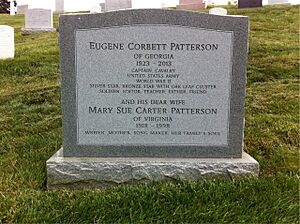Eugene Patterson facts for kids
Eugene Corbett Patterson (born October 15, 1923 – died January 12, 2013) was an American journalist and a strong supporter of civil rights. He was often called Gene Patterson. He won the famous Pulitzer Prize for Editorial Writing in 1967 for his powerful newspaper articles.
Contents
Growing Up and Early Life
Eugene Patterson was born in Valdosta, Georgia. His mother, Annabel Corbett, was a schoolteacher, and his father, William C. Patterson, worked at a bank. During the Great Depression, a tough time when many people lost their jobs and money, his father's bank closed.
His family then moved to a small farm near Adel, Georgia. Their house was very simple, with no running water or electricity. A fireplace was their only source of heat. His mother's teaching job and her work on the farm mostly supported the family, as his father could only find occasional bank jobs.
When he was a teenager, Gene started working on weekends at the local newspaper, the Adel News. He loved journalism so much that he edited a campus newspaper while studying at North Georgia College. He earned a degree in journalism from the University of Georgia in 1943.
War Hero: Serving His Country
After college, Gene joined the United States Army during World War II. He was a tank commander in General George Patton's 10th Armored Division. He showed great bravery during the Battle of the Bulge, a very important battle. For his courage, he received the Silver Star and the Bronze Star. His unit helped hold back the German army for hours, allowing other American troops to arrive. After the war, he became an Army pilot before leaving the military in 1947 to become a journalist.
A Career in Journalism
Gene Patterson started his journalism career at newspapers like the Temple Daily Telegram and the Macon Telegraph. From 1948 to 1956, he worked for United Press, a news agency. Later, he became a top editor for the Atlanta Journal and the Constitution, which are now combined as the Atlanta Journal-Constitution.
Speaking Out for Civil Rights
For eight years, Gene Patterson wrote a signed newspaper article every day. These articles shared his opinions and ideas. In 1963, he wrote a very moving article called A Flower for the Graves. This article was about a terrible church bombing in Birmingham, Alabama, where four young Black girls were killed. The article was so powerful that Walter Cronkite, a famous TV news anchor, asked Gene to read it on live television. This showed how important his words were in the fight for civil rights.
Leading Major Newspapers
In 1968, Gene Patterson became the managing editor of The Washington Post. He played a key role in a very important event. The Nixon administration tried to stop The New York Times from publishing secret government documents known as the Pentagon Papers. These papers showed that President Lyndon Johnson had not told the United States Congress everything about the Vietnam War. Gene Patterson bravely decided to publish these documents in The Washington Post, helping the public learn the truth.
After teaching at Duke University for a short time, he became the president of Times Publishing Company. He also became the editor of the St. Petersburg Times, now called the Tampa Bay Times. Under his leadership, this newspaper became one of the top ten major newspapers in America. He also worked for the St. Petersburg Evening Independent and the Congressional Quarterly.
Standing Up for Ethics
Gene Patterson later became the president of the American Society of Newspaper Editors. He was known for his strong belief in doing what was right, even when it was difficult. He strongly opposed the execution of a man named John Spenkelink in 1979. He even called the Governor of Florida, Bob Graham, in the middle of the night to ask him to change the sentence. Although he was very disappointed, the execution still happened.
In 2002, a historian named Raymond Arsenault wrote a book about Gene Patterson's life and his impact on journalism. In 2010, Gene Patterson was honored by being inducted into the International Civil Rights Walk of Fame.
He received special honors for his work, including an honorary degree from Oglethorpe University in 1966. In 1968, he received the Golden Plate Award from the American Academy of Achievement.
His Final Years
Eugene Patterson passed away in 2013 after receiving treatments for cancer. He was buried at Arlington National Cemetery, a special place where many American heroes are laid to rest.
 | Delilah Pierce |
 | Gordon Parks |
 | Augusta Savage |
 | Charles Ethan Porter |


